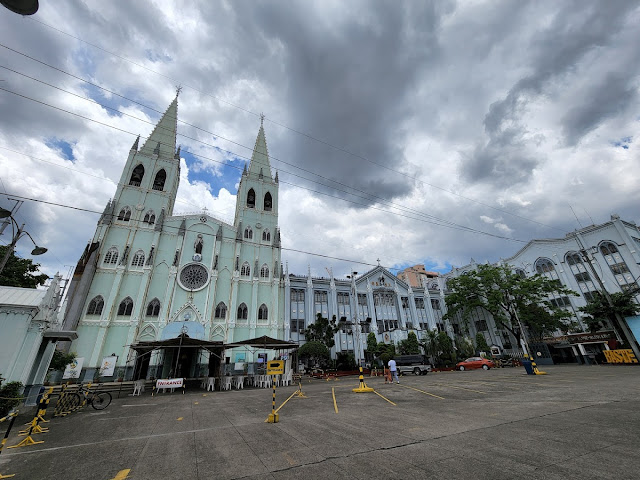All you need to know about this historic church in Quiapo, Manila.
The Minor Basilica of San Sebastian (Filipino: Basilika Menor ng San Sebastian; Spanish: Basílica Menor de San Sebastián), better known as San Sebastian Church (Filipino: Simbahan ng San Sebastian) or San Sebastian Basilica is a minor basilica of the Roman Catholic Church in Manila, Philippines.
It is the church of the Parish of San Sebastian, and also a Shrine of Nuestra Senora del Monte Carmelo, or Our Lady of Mount Carmel.
Loading...
Completed in 1891, San Sebastian Church is noted for its architecture. An example of the Gothic Revival architecture in the Philippines, it is the only steel building church in the Philippines. It was designated as a National Historical Landmark in 1973 and as a National Cultural Treasure in 2011.
San Sebastian Church in Details
Names: San Sebastian Basilica, Basilika Menor ng San Sebastian, Basílica Menor de San Sebastián
Location: Quiapo, Manila
Country: Philippines
Denomination: Roman Catholic
Status: Minor Basilica
Dedication: St. Sebastian
Consecrated: 1891
Functional status: Active
Heritage designation: National Cultural Treasure
Designated: August 15, 2011
Architect: D. Genaro Palacios y Guerra
Architectural type: Basilica
Style: Neo-Gothic
Groundbreaking: 1888
Completed: 1891
Number of domes: 1
Number of towers: 2
Number of spires: 64
Materials: steel, mixed sand, gravel and cement
Administration Subdivision: Vicariate of Jose de Trozo
Archdiocese: Manila
San Sebastian Church History
 |
| San Sebastian Church 1936 |
In the 1880s, Esteban Martínez, the parish priest of the ruined church, approached Spanish Architect Genaro Palacios to build a church that will withstand the earthquakes.
Palacios planned to build a fire and earthquake-resistant structure made entirely of steel. He completed a design that fused Earthquake Baroque with the Neo-Gothic style. His final design was said to have been inspired by the famed Gothic Burgos Cathedral in Burgos, Spain.
San Sebastian Church Construction (1888–1891)
The prefabricated steel sections that would compose the church were manufactured in Binche, Belgium. According to historian Ambeth Ocampo, the knockdown steel parts were ordered from the Societe anonyme des Enterprises de Travaux Publiques in Brussels.
In all, 52 metric tons (51 long tons; 57 short tons) of prefabricated steel sections were transported in eight separate shipments from Belgium to the Philippines, the first shipment arriving in 1888.
Belgian engineers supervised the assembly of the church, the first column of which was erected on September 11, 1890.
The walls were filled with mixed sand, gravel, and cement. The stained glass windows were imported from the Heinrich Oidtmann Company, a German stained glass firm, while local artisans assisted in applying the finishing touches.
According to Jesús Pastor Paloma, an Augustinian Recollect priest, the structure was also supposed to have a prefabricated retablo (reredos) altar, which was lost at sea when the ship carrying it from Belgium capsized in a storm.
A wooden altar was made locally in its stead. Paloma also noted that the bottom part of the church was designed to resemble a ship's hull, so that it would sway during an earthquake.
Restoration (2011–present)
Restoration works for San Sebastian Church began in 2011.
 |
| San Sebastian Church |
OTHER CHURCHES TO VISIT IN MANILA
- Manila Cathedral
- San Agustin Church in Intramuros, Manila
- Basilica of the Black Nazarene a.k.a. Quiapo Church in Manila
- Minor Basilica of San Lorenzo Ruiz a.k.a. Binondo Church
- Our Lady of Remedies Parish (Malate Catholic Church)
San Sebastian Church Features
San Sebastian Church has two openwork towers and steel vaulting. From its floor, the basilica's nave rises 12 meters (39 ft) to the dome, and 32 meters (105 ft) to the tip of the twin spires.
The faux finished interior of the church incorporates groined vaults in the Gothic architecture style permitting very ample illumination from lateral windows.
The steel columns, walls and ceiling were painted by Lorenzo Rocha, Isabelo Tampingco and Félix Martínez to give the appearance of marble and jasper. Trompe-l'œil paintings of saints and martyrs by Rocha were used to decorate the interiors of the church.
True to the Gothic revival spirit of the church are its confessionals, pulpit, altars and five retablos designed by Lorenzo Guerrero and Rocha. The sculptor Eusebio Garcia carved the statues of holy men and women. Six holy water fonts were constructed for the church, each crafted from marble obtained from Romblon.
Above the main altar is an image of Our Lady of Mount Carmel, given to the church by Carmelite sisters from Mexico City in 1617. The image withstood all the earthquakes and fires which had destroyed previous incarnations of San Sebastian Church, but its ivory head was stolen in 1975.
Cultural and Historical Declarations
San Sebastian Church was declared a National Historical Landmark by President Ferdinand Marcos through Presidential Decree No. 260 on August 1, 1973. Subsequently, the church was declared a National Cultural Treasure by the National Museum of the Philippines on August 15, 2011, with the unveiling of the marker on January 20, 2012.
 |
| San Sebastian Church Historical Marker |
On May 16, 2006, San Sebastian Church was included by the National Historical Institute (now the National Historical Commission of the Philippines) in the Philippines' Tentative List for possible designation as a World Heritage Site, on account of its architectural and historical heritage.
As of 2017, the church is no longer included in the Tentative List.
Preservation
In recent years, San Sebastian Church has encountered threats to its structural integrity. The steel structure has been beset by rust and corrosion due to sea breezes from nearby Manila Bay.
State funding was accorded to the church through the National Historical Institute which undertook restoration in 1982. The Recollect community has likewise expended funds for the church's maintenance and restoration.
In 1998, it was placed on the biennial watchlist of the 100 Most Endangered Sites by the World Monuments Fund, though it was not retained in the subsequent watchlists.
The church was listed again as one of the most endangered monuments in the world by World Monuments Fund in the 2010 World Monuments Watch, along with the Rice Terraces of the Philippine Cordilleras and Santa Maria Church. All of the sites were taken off the list in 2011 after the passage of the National Cultural Heritage Act.
How to Get to San Sebastian Church
If you are coming around LRT 1, head to the Doroteo Jose Station as your drop-off point. Ride a jeep in Recto with Sta. Mesa route. Afterward, get off around Mendiola before reaching the crossing, walk through the Ayala Bridge, and turn right before reaching San Rafael Street. From there, you will catch sight of a light blue Gothic church.
ATTRACTIONS TO SEE IN MANILA
Klook.comSan Sebastian Church
Address: Pasaje del Carmen St, Quiapo, Manila, 1001 Metro Manila
Phone Number: (02) 8708 5122
Email Address: savesansebastian.org@gmail.com
Website: sansebastianconservation.org
San Sebastian Church Mass Schedule
The San Sebastian Church is open from Tuesday-Friday at 9:00 AM- 3:00 PM, and the mass schedule:
- Tuesday-Friday: 8:00 AM
- Saturday: 4:00 PM Mass with Sign Language Interpreter
- Sunday: 8:00 AM & 10:00 AM
WHERE TO NEXT?
- VISITA IGLESIA GUIDE: 7 Churches to Visit in Manila (Location & Map)
- PILGRIMAGE: List of Marian Shrines in the Philippines
- MANILA TRAVEL GUIDE: Tourist Spots, Things To Do, Where To Eat and Where to Stay
- REDISCOVER MANILA: 20+ Tourist Spots To Visit At Night (Things To Do & New Places To Go)
- INTRAMUROS GUIDE: Historic Walled City in Manila (What to See & to Do)
ACTIVITIES AND TOURS IN MANILA
WHERE TO STAY IN MANILA
Here's a list of hotel accommodation you can book in Manila:
- Octagon Mansion Hotel - Check Rates and Availability!
- Bayview Park Hotel - Check Rates and Availability!
- Go Hotels Ermita - Check Rates and Availability!
- City Garden Suites Hotel - Check Rates and Availability!
- Pearl Manila Hotel - Check Rates and Availability!
- Sunny Bay Suites - Check Rates and Availability!
 IMPORTANT NOTE: The rates, contact details and other information indicated in this post are accurate from the time of writing but may change without IMFWJ's notice. Should you know the updated information, please let us know by leaving a message in the comment box below.
IMPORTANT NOTE: The rates, contact details and other information indicated in this post are accurate from the time of writing but may change without IMFWJ's notice. Should you know the updated information, please let us know by leaving a message in the comment box below.





















No comments
Let us know your thoughts!